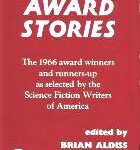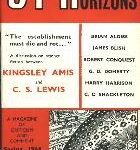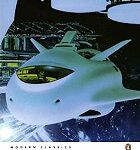Fiction
- The Rain Will Stop (1942)
…but first published by The Pretentious Press in (2000) - The Brightfount Diaries (1955)
- Space, Time and Nathaniel (1957)
Short story collection; all his published science fiction to that date, including “T”, his first published story, and “Not For an Age”. Aldiss had only had thirteen stories published at that time, and a fourteenth was hurriedly written to make up the numbers. - Non-Stop (1958)
A member of a culturally-primordial tribe investigates the dark, jungle filled corridors that surround him to ultimately uncover the true nature of the universe he inhabits. This was published in the US as Starship. - Equator (1958)
…published in the United States as Vanguard from Alpha - The Canopy of Time (1959)
Short story collection: published in slightly different format in the US as Galaxies like Grains of Sand - No Time Like Tomorrow (1959)
Short story collection published for the US market by New American Library imprint Signet Books. (Includes the following stories: T, Not for an Age, Poor Little Warrior!, The Failed Men, Carrion Country, Judas Danced, Psyclops, Outside, Gesture of Farewell, The New Father Christmas, Our Kind of Knowledge) - The Interpreter (1960; US title Bow down to Nul)
A short novel about the huge, old galactic empire of Nuls, a giant, three-limbed, civilised alien race. Earth is just a lesser-than-third-class colony ruled by a Nul tyrant whose deceiving devices together with good willing but ineffective attempts of a Nul signatory to clarify the abuses and with the disorganised earthling resistance reflect the complex relationship existing between imperialists and subject races which Aldiss himself had the chance of seeing at first hand when serving in India and Indonesia in the forties. - The Male Response (US: 1959, UK 1961)
Only marginally science fiction, the story tells how the indecisive Soames Noyes (No-Yes) is sent by his company with a computer to the newly free black state of Goya, in Africa, where he becomes entangled with women and witch-doctors. - The Primal Urge (1961)
The Primal Urge is a 1961 science fiction novel by Brian Aldiss. A satire on sexual reserve, it explores the effects on society of a forehead-mounted Emotion Register that glows when the wearer experiences sexual attraction. The book was banned in Ireland. - Hothouse (1962)
Set in a far future Earth, where the earth has stopped rotating, the Sun has increased output, and plants are engaged in a constant frenzy of growth and decay, like a tropical forest enhanced a thousandfold; a few small groups of elvish humans still live on the edge of extinction, beneath the giant banyan tree that covers the day side of the earth. This assemblage of stories, published in abridged form in the American market as The Long Afternoon of Earth, won the Hugo Award for short fiction in 1962. - The Airs of Earth (1963)
Short story collection; American title Starswarm - The Dark Light Years (1964)
The encounter of humans with the utods, gentle aliens whose physical and mental health requires wallowing in mud and filth, who are not even recognised as intelligent by the humans. - Greybeard (1964)
Set decades after the Earth’s population has been sterilised as a result of nuclear bomb tests conducted in Earth’s orbit, the book shows an emptying world, occupied by an ageing, childless population. - Best SF stories of Brian Aldiss (1965)
Published in the US as But who can replace a Man? - Earthworks (1965)
A bleak and hallucinatory vision of Malthusian over-population, enlarged from the novella Skeleton Crew, where criminals are condemned to work on the polluted land. Knowle Noland decides in the end that to precipitate world war might be a way of starting over again: more a sixties solution than an eighties one. - The Impossible Smile (1965)
Serial in Science Fantasy magazine, under the pseudonym “Jael Cracken” - The Saliva Tree and other strange growths (1966) Story collection. The title story of the collection, The Saliva Tree was written to mark the centenary of H.G. Wells’s birth, and received the 1965 Nebula Award for the best novalla.
- An Age (1967: also published in the US as Cryptozoic!) a dystopic time-travel novel.
- Report On Probability A (1968) Described by Aldiss as an ‘anti-novel’, this book had its origins some years earlier, before being serialised in New Worlds under Michael Moorcock’s editorship. The bulk of the book is the Report, describing in minute, obsessive and often repetitive detail, three characters G, S, and C as they secretly watch a house, each from a separate outbuilding with peripheral views of the house’s windows, catching occasional glimpses of its occupant, Mrs Mary. As the Report is being read by a character called “Domoladossa'”, he is secretly being observed from other universes, and these observers in their turn are being observed, all of them engaged in futile speculation about the exact nature of Probability A, and the exact meaning of the Victorian painting, The Hireling Shepherd (by Pre-Raphaelite William Holman Hunt; Holman Hunt’s paintings also feature in Aldiss’s short story The Secret of Holman Hunt and the Crude Death Rate, published in 1975), which occurs in the Report. Later we learn that Mrs. Mary is watching a screen of her own, although this may just be a television set, and it is suggested that the painting may be a window into a world where time is standing still.
- ed. Farewell Fantastic Venus (1968)
- Barefoot in the Head (1969) Perhaps Aldiss’s most experimental work, this first appeared in several parts as the ‘Acid Head War’ series in New Worlds. Set in a Europe some years after a flare-up in the Middle East led to Europe being attacked with bombs releasing huge quantities of long-lived hallucinogenic drugs. Into an England with a population barely maintaining a grip on reality comes a young Serb, who himself starts coming under the influence of the ambient aerosols, and finds himself leading a messianic crusade. The narration and dialogue reflects the shattering of language under the influence of the drugs, in mutating phrases and puns and allusions, in a deliberate echo of Finnegans Wake.
- Neanderthal Planet (1970) Collection of four short stories.
- The Horatio Stubbs saga
- [The Hand-Reared Boy (1970)
- A Soldier Erect (1971)
- A Rude Awakening (1978)
- The Moment of Eclipse (1971: short story collection) — British Science Fiction Award winner, 1971
- The Book of Brian Aldiss (1972) (UK title The Comic Inferno) Short story collection
- Frankenstein Unbound (novel)|Frankenstein Unbound (1973) A 21st century politician is transported to 19th century Switzerland where he encounters both Frankenstein and Mary Shelley. It was the basis for the 1990 film of the same title, directed by Roger Corman.
- The 80 minute Hour (1974) A weird and ambitious “space opera” where the characters actually sing. The world is in chaos after nuclear war causes time slips and even those that believe they rule the world have trouble knowing where and when they are.
- The Malacia Tapestry (1976)
- Brothers of the Head (1977) This was a large-format book, illustrated by Ian Pollock, telling the strange story of the rock stars Tom and Barry Howe, Siamese twins with a third, dormant head, which eventually starts to awaken. Also adapted for film by Keith Fulton and Lou Pepe, released in 2006.
- Last Orders and Other Stories (1977)
- Enemies of the System (1978)
- Pile (1979; Poem)
- New Arrivals, Old Encounters (1979)
- Moreau’s Other Island (1980)
- The Squire Quartet
- Life In The West (1980)
- Forgotten Life (1988)
- Remembrance Day (1993)
- Somewhere East Of Life (1994)
- The HelliconiaTrilogy
- Helliconia Spring (1982) — BSFA winner, 1982; Nebula Award nominee, 1982; Campbell Award winner, 1983
- Helliconia Summer (1983) — BSFA nominee, 1983; Locus Award nominee, 1984
- Helliconia Winter (1985) — BSFA winner, 1985; Nebula Award nominee, 1985;Locus Award nominee, 1986
- Seasons in Flight (1984)
- Courageous New Planet (c. 1984)
- The Year before Yesterday (1987); A fix-up of Equator from 1958 combined with The Impossible Smile from 1965.
- Ruins (1987)
- Dracula Unbound (1990)
- A Tupolev too Far (1994)
- Somewhere East of Life: Another European Fantasia (1994)
- The Secret of This Book (1995) (Common Clay: 20-Odd Stories US)
- (with Roger Penrose) White Mars Or, The Mind Set Free (1999)
- Supertoys Last All Summer Long|Super-Toys Last All Summer Long and Other Stories of Future Time (2001) The title story was the basis for the Steven Spielberg film A.I.
- Super-State (2002)
- The Cretan Teat (2002)
- Affairs at Hampden Ferrers (2004)
- Cultural Breaks (2005); his last collection of short stories.
- Jocasta (2005); A re-telling of Sophocles’ Theban tragedies concerning Oedipus and Antigone. In Aldiss’ novel, myth and magic are vibrantly real, experienced through an evolving human consciousness. Amidst various competing interpretations of reality, including the appearance of a time-travelling Sophocles, Aldiss provides an engaging alternative explanation of the Sphinx’ riddle.
- Sanity and the Lady (2005)
- HARM (2007) — 2008 Campbell Award nominee[citation needed]
- Walcot (2010); a novel covering the life of a family throughout the 20th century.
Poetry
- Home Life With Cats (1992)
- At The Caligula Hotel (1995)
- Songs From The Steppes Of Central Asia (1995)
- A Plutonian Monologue on His Wife’s Death (The Frogmore Papers, 2000)
- At A Bigger House (2002)
- The Dark Sun Rises (2002)
- A Prehistory of Mind (2008)
- Mortal Morning (2011)
Non-fiction
- Cities and Stones – A Traveller’s Yugoslavia (1966)
- The Shape of Further Things (1970)
- Item Eighty Three (with Margaret Aldiss) (1972): a comprehensive bibliography of all books and short works published to that date. (The book is number 83 in its own list).
- Billion Year Spree: The History of Science Fiction (1973) in which he argues that Mary Shelley’s Frankenstein was the first true science fiction novel. Revised and expanded as Trillion Year Spree (with David Wingrove)(1986). The initial edition won a special award from the British Science Fiction Association in 1974; the 1986 expansion won the Hugo Award for the year’s best nonfiction book. Aldiss began his Hugo acceptance speech by proclaiming “It’s a long time since you’ve given me one of these, you miserable bastards!”
- Hell’s Cartographers (1975, edited with Harry Harrison): a collection of short autobiographical pieces by a number of science fiction writers, including Aldiss. The title is a reference to Kingsley Amis’s book about science fiction, New Maps of Hell
- The Pale Shadow Of Science (1986)
- This World and Nearer Ones: Essays exploring the familiar (1979)
- The Detached Retina: Aspects of SF and Fantasy (1995)
- The Twinkling of an Eye or My Life as an Englishman (1998)
- When the Feast is Finished (with Margaret Aldiss) (1999)
- Art after Apogee: The Relationships between an Idea, a Story, a Painting (with Rosemary Phipps) (2000)
- Bury My Heart at W.H. Smith’s – A Writing Life (1990) – an autobiography
Short story collections
( As editor )
- Penguin Science Fiction (1961)
- More Penguin Science Fiction (1963)
- Yet More Penguin Science Fiction (1964)
- The Year’s Best Science Fiction No.1 (with Harry Harrison) (1968)
- The Year’s Best Science Fiction No.2 (with Harry Harrison) (1969)
- The Year’s Best Science Fiction No.3 (with Harry Harrison) (1970)
- The Year’s Best Science Fiction No.4 (with Harry Harrison) (1971)
- The Year’s Best Science Fiction No.5 (with Harry Harrison) (1972)
- The Year’s Best Science Fiction No.6 (with Harry Harrison) (1973)
- The Penguin Science Fiction Omnibus (1973)
- Space Opera (1974)
- Decade: the 1950’s (with Harry Harrison) (1976)
- Evil Earths (1976)
- Galactic Empires, Volume 1 (1976)
- Galactic Empires, Volume 2 (1976)
- Mini Sagas from the Daily Telegraph Competition (1998) ISBN 9780750915946
- Mini Sagas From the Daily Telegraph Competition 2001 (2001) ISBN 978-1-900564-77-9
Other
- “Umwelts for Hire”, a Doctor Who short story published in Doctor Who Brilliant Book 2011 (BBC Books, 2010, ISBN 978-1-846-07991-7)





[…] “Bibliographies.” BrianAldiss.co.uk. Web. 7 October 2012. […]